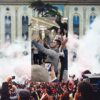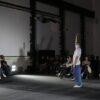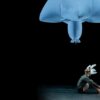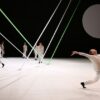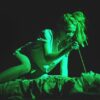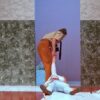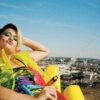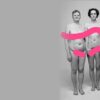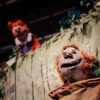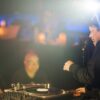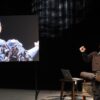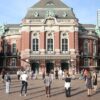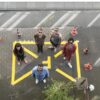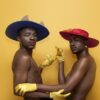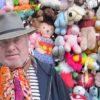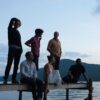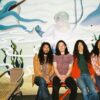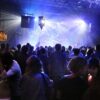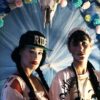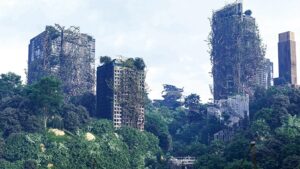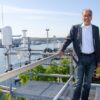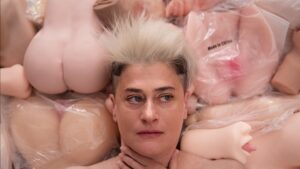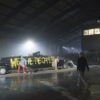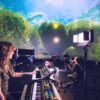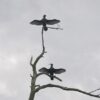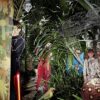

Dear Guests
as far as the future is concerned, well-known science fiction author William Gibson makes it clear that his books are not predictions or speculations about what is to come, but “take the temperature of the present”. For Gibson, science fiction is a literary toolkit to describe an increasingly wired present. If now this festival – aesthetically and content-wise brimming with the present – deals with the future, dystopia is obvious. Because it does describe catastrophic conditions in the future as direct results of our present actions. Which also means, that, theoretically, we now could still prevent the foreseeable hell.
This applies to no other topic as much as to climate change, which encompasses all current human issues from nutrition to migration, and moves an entire next generation against VW and the likes, not only on Fridays. The American author David Wallace-Wells has written the matching compulsory book for all thinking (and especially living) people: “The Uninhabitable Earth” is a groundbreaking summary of facts and scientific hypotheses on global warming. Wallace-Wells will talk about this as a guest at the festival conference of journalist Hannes Grassegger, and in addition, climate scientist Mojib Latif will give a lecture. Dystopias though, are often delivered through big pictorial narratives, through which we first grasp the future. This demonstrates a new largescale stage work by the Belgian theatrical iconoclast Kris Verdonck, and a film program by the newly appointed Berlinale program director Mark Peranson.
Perhaps the praying mantises – as on the cover of this program booklet – will be the last to jump into the wormhole of posthuman genesis. Insects, however, are also the first exhausted victims of global warming. So it‘s a good thing that the retail tycoon Walmart has just patented robotic bees. God is a Silicon Valley technologist anyway, and humans will soon be on permanent vacation. Or at least they don‘t have to be on stage themselves anymore, like the German bestselling author Thomas Melle with his bipolar disease. In an impressive piece by Rimini Protokoll, he is replaced by a humanoid robot and gives a positive interpersonal example of body and machine. Maybe we simply have to think bigger into the future like Stephen Hawking, who, in view of the destruction of the earth‘s atmosphere, expected us to colonize other planets to survive. That the extraterrestrials might also have a tone in the matter of human history of colonization, shows SPACE – THE 3RD SEASON, Josh “Socalled” Dolgin‘s gorgeous puppet-musical-series’ third part. And if you don‘t want to wait for Elon Musk‘s Mars expedition, but still are adventurous, you might take off into other spheres with the JAJAJAs, or book a trip with musical virtuoso Kid Koala’s SATELLITE. This piece is quite family friendly, which doesn‘t apply to a visit to the museum of Norwegian group Susie Wang: in their exciting horror illusion theatre MUMMY BROWN, a black hole and objects from outer space are exhibited, which the pregnant museum visitor better not have touched. The piece is part of Susie Wang‘s horror trilogy about the human relationship to nature and the female body. The fact that the female body can be bold, multi-faceted and dazzling is best shown by the feminist pop icon Peaches, who has been questioning social power relations for 20 years and will present one of a total of eight festival world premieres (of which three, for the first time, will be produced for the large hall K6): In her stage work with almost 40 participants, Peaches will create a (less dystopian) vision for the future of feminism. Moreover, the queer art pioneer opens her first institutional solo exhibition in the Kunstverein and presents an accompanying program with a lustful vaudeville show and four excessive club evenings.
Often it is the clubs, that are nucleuses for social change and safe spaces for young people and queers, even in repressive systems. This also applies to the famous Bassiani club in the Georgian capital of Tbilisi, where brutal police raids in 2018 triggered expressions of solidarity and protests throughout Europe. An event that also serves as a backdrop for the festival’s opening piece in the big hall, MARRY ME IN BASSIANI, by the French media art collective (LA)HORDE: a spectacular stage overpowering with 15 former dancers of the Georgian National Ballet about dance as a medium of peaceful resistance. (LA)HORDE, who have just been appointed as new directors of the prestigious Ballet de Marseille, will also present a live art installation on resistance and affirmation in the huge Kampnagel Vorhalle. This is only one example of the festival‘s expanded concept of art. The impulses that arise from overlapping genres will also sparkle in the collaboration between Canadian choreographer Aszure Barton and musician Hauschka: Barton, who radically rejuvenates dance worldwide, will rehearse for two months in Hamburg with Hauschka and a large ensemble for their festival world premiere WHERE THERE‘S FORM. These and other world premieres, such as the one with Carsten “Erobique” Meyer on the underexposed pop cultural heritage of the ‘70s GDR music, or new discoveries such as the masked Russian performers of Vasya Run, are only possible through great supporters an cooperation partners: The Elbphilharmonie hosts the three Kampnagel accomplices Soap&Skin, Chilly Gonzales (who’s also a close collaborator of Peaches), as well as the Aarhus Symfoniorkester with the Bell Orchestre. The latter features Richard Reed Parry, whom we also present with an immersive concert at the Hamburg Planetarium as part of the NEW INFINITY series in collaboration with Berliner Festspiele. As always, there is much more madness to discover, please click through!
The space shuttle is ready; we’ll take off daily in the Avant-Garden with Migrantpolitan & Co and will end up every night in the club (with a program ranging from Japanese Psych-Rock to the avant-garde legend Charlemagne Palestine). Big thanks to all who have trusted and supported us so far, and to you, ready to fly with us into the future.
See you soon,
András Siebold & The Summer Festival Team

